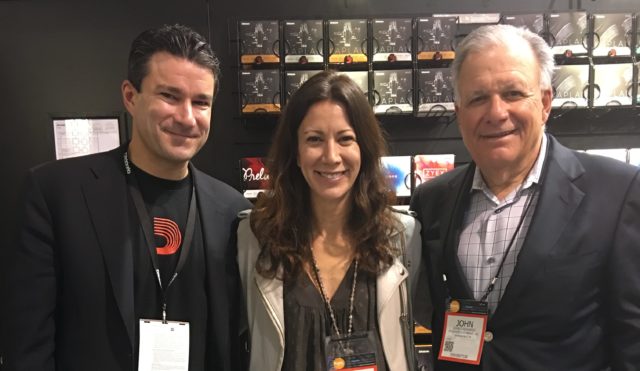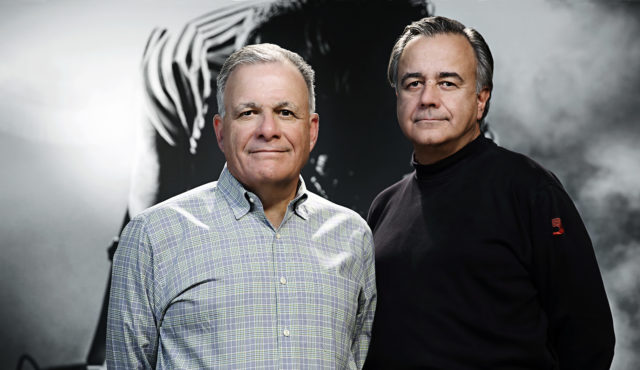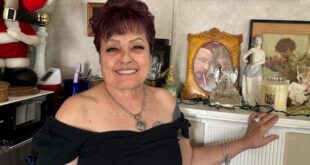
Her family has made music strings for hundreds of years. As head of the D’Addario Foundation, Suzanne D’Addario Brouder toils to make music education possible for underserved kids.
Imagine growing up among music royalty, the guitar-string makers to the stars. These days, the roll call of artists using D’Addario strings includes the likes of Keith Urban, Dave Matthews, Joe Satriani, Al Di Meola, Mark Knopfler of Dire Straits — and if you’ve got a few hours, we could supply you a list of hundreds more. Is it fair to say that the D’Addario family — which has been at this string-making thing since at least the 1680s — changed popular music history for good? Let’s put it this way: It would be unfair to say they didn’t.
And yet Suzanne D’Addario Brouder isn’t one to rest on her family’s laurels. Whatever share of the spotlight she could claim she directs instead toward the children, volunteers and organizations that inspire her work with the Brooklyn-based D’Addario Foundation. As director, she works to support the most effective organizations fighting to improve access to music education.
D’Addario Brouder is pursuing her mission at perhaps the toughest time in the history of modern public education. Music and arts programs have been slashed nationwide, and while private instruction can fill some of the gaps, countless students from low-income backgrounds have been cast adrift. The inequalities run deep, but D’Addario Brouder is beyond tireless in her work: She’s passionate and determined to lead the foundation in making an impact.
Lou&A sat down with her to learn more about her family’s colorful history and how the musical success of her father and uncle created a deep desire to give back out of gratitude, and make music education flourish once again.

Lou&A: D’Addario strings are thought of largely in the context of popular music. But your Italian ancestors from the small town of Salle were making strings since before Mozart’s birth.
Suzanne D’Addario Brouder: On the baptismal form filled out by Donato D’Addario in 1680, his occupation stated simply that he was a “cordaro,” the Italian word for “string maker.” The trade of the town seemed to be one of two things: You were either a farmer of the rich countryside or you made strings. The D’Addario family was equal parts farmers and string makers.
Lou&A: A few years back you had the chance to travel to Salle, which is in the Italian province of Pescara. What was that like?
SDB: The town is pretty small. The local government decided to invest a little money in building the Museo Delle Corde Armoniche to celebrate the historical lineage of the cordari. It’s a very humble space but significant for this town of about 400 people. I had the privilege of representing my family at the grand opening of the museum and received a key to the city. It was such a wonderful experience.
L&A: Tell us about growing up in the D’Addario family.
SDB: It’s hard to describe the experience of growing up in a family so inextricably linked to a business. When we were kids, my father took great pride in showing his children what he created and encouraged us to spend time at the factory. In the summer, we would help hand-coil strings — something that’s still done today — or work in the distribution center preparing boxes for shipment. I think as with most kids, we learned the most by just observing our parents. We observed curiosity, ambition, compassion and a bit of impatience. My parents have always expected a lot of others as they do of themselves. I think that drive served them well and had a deep effect on how we were raised — and how my siblings and I function today.

L&A: How did your family influence the work you’re doing today?
SDB: A lot of it has to do with my father (John Jr.) and my uncle (Jim). They had humility and brought it to their work; they were so gratified by the success they had with the business that they had a really, really strong will to give back. They both obviously loved music and when you have a passion for it, you’re willing to sacrifice a lot to share it with others. So that always permeated my upbringing: their desire and commitment to pay attention to the landscape of music education and what may happen in the future.
L&A: So much of the foundation’s work is based on the powerful correlation between music and enhanced learning. What’s behind that?
SDB: We try to say music and the arts are part of the core educational experience. Some kids may not flourish in traditional subjects, but when you expose them to music, they might demonstrate a different kind of learning where they’re successful. Music also has a positive influence in terms of social development, self discipline, self expression, confidence when taking risks and working in a collaborative way with others. We’ve seen in studies that teachers and parents report a tremendous increase in engagement because of music.
L&A: You’ve been foundation director for eight years. What’s the most rewarding part of this work?
SDB: I love seeing and visiting programs, connecting to individual students — and knowing by talking to them, and seeing them, that what we’re doing makes a significant difference. When you run a business and sit in front of a computer for too many hours, it’s great to be reminded that you’re doing impactful and amazing work — and that you’re getting so much help from amazing community players. And music? It’s such a powerful, beautiful, emotional thing. It really connects people. It really is changing their lives.
L&A: And the most challenging?
SDB: There are so many challenges — especially in trying to convince people what’s missing and the importance of having it there. It’s also challenging to describe how we’re working the landscape: that we’ve chosen to work with independent non-profits as opposed to convincing schools to reinstate music. Those non-profits have strength and power because very passionate and driven people generally set them up. There’s more commitment and less bureaucracy and attrition than what you might see in schools. And they understand music and music education: The quality of what they can execute is higher.
L&A: You could’ve chosen to do anything with your life and your family clearly had the means to support it. Why this?
SDB: My uncle and my father, with their Italian heritage, were very pragmatic people with a strong work ethic on the border of martyrdom. [Laughs.] Ironically my dad wanted to see me become a piano player, but I always thought of myself getting into some sort of business. I’ve always loved music, and my parents would say that I’m a sensitive, compassionate person. I visited music programs and the work really intrigued me. It exposed me to something I hadn’t been exposed to before — and it was powerful.
100 percent of every dollar donated to the D’Addario Foundation goes directly to support the most transformative community music programs in the world. For more information, visit daddariofoundation.org.
The above appeared in the April issue of the print version of Fra Noi. Our gorgeous, monthly magazine contains a veritable feast of news and views, profiles and features, entertainment and culture. To subscribe, click here.
 Fra Noi Embrace Your Inner Italian
Fra Noi Embrace Your Inner Italian






